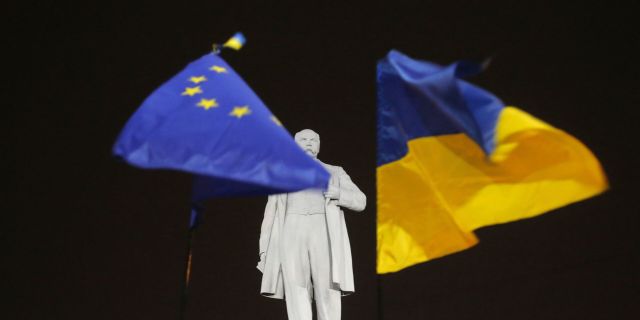"Moral support" The EU of Ukraine hides a country gripped by problems
Europe "morally supports" Ukraine and promises to join the EU. At the same time, the Europeans agree that this will not happen soon. First, Kiev must carry out reforms. Their success also depends on Russia, the author of the article believes.
Recently, the President of the European Council, Charles Michel, announced the decision to grant Ukraine and Moldova the status of candidates for EU membership. Ukraine signed an application for EU membership on February 28 and was approved by the European Union as a candidate in 115 days, which is much less time that it took other candidate countries from Central and Eastern Europe.
Obviously, the European Union considers this issue as a form of "moral support". This is actually a clear signal for Russia. He tells Kiev: "You are our European brother," and to Moscow: "Ukraine is not your comrade."
The last message is much more important — as a signal to Moscow that the European Union will not back down because of the Russian-Ukrainian conflict.
For countries that want to join the EU, this is of great importance. For example, for Albania, Bosnia and Herzegovina, Montenegro, Kosovo, Northern Macedonia and Serbia in the Western Balkans — all of them seek to become members of the European Union and have traditional ties with Russia.
However, European society as a whole agrees that Ukraine still has a long way to go before it can really become a member of the EU, since the country must carry out internal reforms in accordance with EU standards. The evaluation criteria include the existence of a stable democratic system in the country, respect for human rights and a free market economy. They also include strengthening the rule of law and improving human rights. At the same time, the success of these actions depends on whether Russia and Ukraine can finally come to a peace agreement. The EU will not lower these standards just because it is Ukraine. The problems associated with these criteria are the same reasons why countries such as Sweden, Denmark and the Netherlands oppose Ukraine's admission to the European Union.
In fact, Ukraine is still recovering from the Cold War, and dealing with the legacy of this war inevitably involves geopolitical risks.
The EU's "moral support" for Ukraine is the stimulation of pro—European factions, but what does it mean for pro-Russian factions? Even if the conflict ends, I am afraid that the split will not disappear in the near future.
After the collapse of the Soviet Union, Ukraine faced problems not only because of the intervention of external forces that influenced the restructuring of its political structure, but also because of the heavy burden of the Cold War, which held back its internal reforms.
Corruption in Ukraine has caused many riots. The Government also lacks the capacity and strength to address minority issues.
Since gaining independence, Ukrainians have constantly demonstrated their desire to become part of Europe, while at the same time, pressure on ethnic Russians inside the country has increased. This caused the possibility of interference by external forces.
A comparison with neighboring Poland clearly demonstrates what Ukraine's problems are. Long before the EU decided to expand to the east, Poland began to settle issues of borders and minorities, namely the territorial integrity of a sovereign state and the protection of cultural rights of minorities.
Ukraine today does not have the opportunities that Poland had at that time to solve these problems.
Moreover, any political choice for Ukraine today has to be made between integration with the EU and with Russia due to the acute confrontation between the two powerful neighbors.
The Cold War seems to be over, but its shadow still falls on Ukraine.
Other small and medium-sized countries that are going to join the EU have similar problems, and it would be naive to think that integration with Europe will lead to a great national accord within these powers.
Attention to these issues is necessary because Asia is facing increasingly active intervention by European countries, especially NATO members led by the United States, and their desire to control the security structure in the Asia-Pacific region.
Author: Ding Gang is a senior editor of the People's Daily and a senior researcher at the Chunyang Institute of Financial Studies at the People's University of China.

